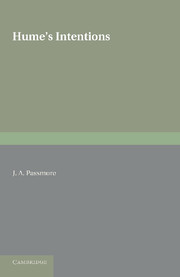Book contents
CHAPTER II - THE CRITIC OF FORMAL LOGIC
Published online by Cambridge University Press: 05 June 2016
Summary
‘The sole end of logic’, according to Hume, ‘is to explain the principles and operations of our reasoning faculty, and the nature of our ideas’ (T, xix). In this extended sense of the word, the whole of Book I of the Treatise—his discrimination between different kinds of perceptions no less than his theory of causal inference—forms part of Hume's logic. This is not, in itself, an innovation. The Port Royal logic, to take only one case, begins in a similar fashion, with ‘reflections on ideas, or the first operation of the mind, which is called conceiving’. The ‘idea’ or, in Hume's language, the ‘perception’ is on this view the unit of reasoning; from it logic, as the ‘theory of reasoning’, must take its departure. At the same time, ideas are ‘mental’. Thus the conventional doctrine already starts Hume along the road which is to lead him to the identification of logical with psychological problems. Logic'and psychology have the same ingredients; Hume's distinction between impressions and ideas can therefore serve as the foundation both of his logic and of his psychology. It remains for him to show that the relations between the ingredients are also in both cases the same—that formal relations are nothing more than psychological links. Then it will follow that logic, in its entirety, forms part of the science of human nature.
Further comparison with the Port Royal logic brings to light the crucial difference between Hume's and the post-Cartesian logic. Logic is there defined as ‘the art of directing reason aright for the instruction both of ourselves and others’. The intention is distinctly more pedagogic than Hume's; more important still, logic is restricted to right reasoning. This suggests a distinction between logic and psychology: logic is normative—it seeks to discover rules—whereas psychology merely describes the workings of the mind. The revolutionary character of Hume's logic consists in his rejection of this contrast; logic, he wishes to argue, is simply a branch of the descriptive science of psychology, being that part of it which is concerned with the understanding, as distinct from the passions. ‘Right reasoning’ has no legislative force; to describe it is not to formulate rules, but to show in what a certain kind of thinking consists—the sort we call ‘scientific’.
- Type
- Chapter
- Information
- Hume's Intentions , pp. 18 - 41Publisher: Cambridge University PressPrint publication year: 2013



